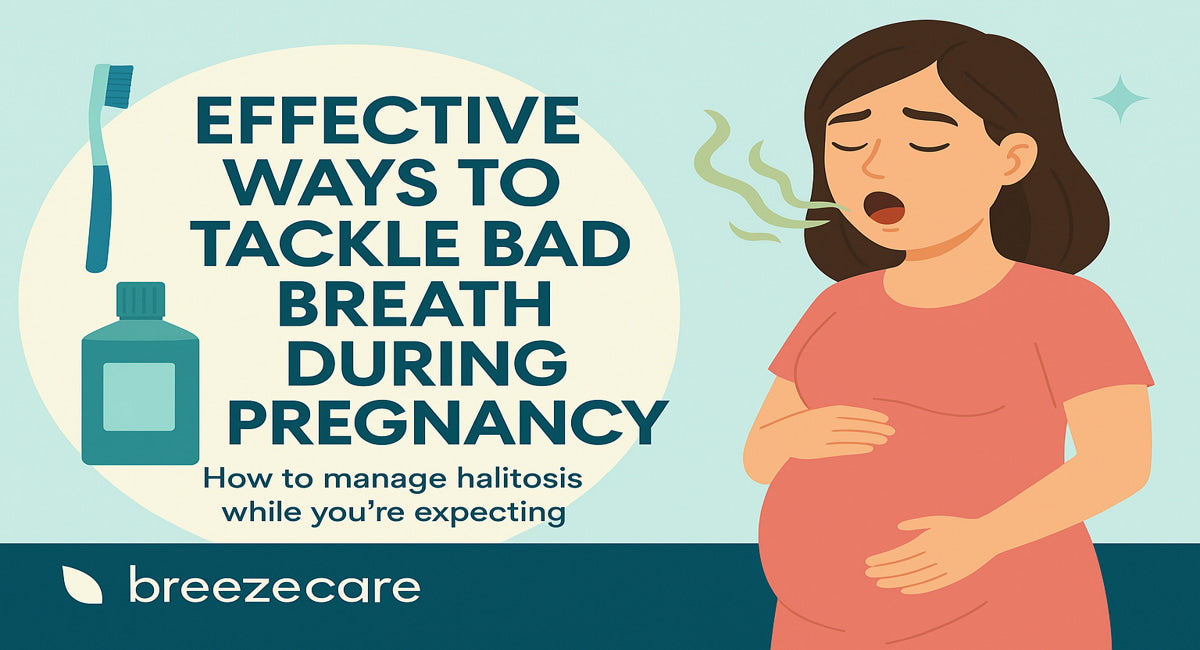Pregnancy brings plenty of beautiful changes, but also a few unexpected ones, like bad breath during pregnancy.
Yep, it’s a real thing, and if you’ve noticed your breath isn’t as fresh as usual since falling pregnant, you’re definitely not alone. In fact, hormonal shifts, morning sickness, changes in diet and even dry mouth can all contribute to pregnancy halitosis.
While it’s completely normal, that doesn’t mean you have to put up with it. In this blog post, we’ll uncover the common causes of bad breath during pregnancy, what’s going on inside your mouth (and body) and the most effective ways to treat and prevent it so you can breathe a little easier with confidence.
Why Does Bad Breath Happen During Pregnancy?
Bad breath during pregnancy can be triggered by several factors, many of which are tied to the body’s natural changes during this time. These include:
1. Hormonal Changes
Increased levels of hormones, such as progesterone and oestrogen, can affect the way your body responds to bacteria in the mouth. This can lead to gum inflammation (pregnancy gingivitis), which may produce a bad smell.
2. Dry Mouth
Pregnancy can reduce your saliva flow, resulting in dry mouth, a key contributor to bad breath. Saliva plays a crucial role in cleansing the mouth and breaking down food particles.
3. Morning Sickness
Frequent vomiting due to morning sickness exposes your mouth to stomach acids, which can cause enamel erosion and unpleasant breath odours.
4. Dietary Changes and Cravings
Pregnancy cravings often include sugary or acidic foods, which can contribute to plaque build-up and odour. On top of that, the smell of certain pregnancy-safe foods can linger longer than expected.
5. Poor Oral Hygiene
Fatigue or nausea may cause pregnant women to skip brushing or flossing, leading to plaque build-up, tooth decay and yes, bad breath.
How to Prevent and Manage Bad Breath during Pregnancy
Fortunately, there are several practical steps you can take to minimise or eliminate bad breath during pregnancy.
1. Maintain a Consistent Oral Hygiene Routine
-
Brush at least twice a day with fluoride toothpaste.
-
Use a soft-bristled toothbrush to avoid aggravating sensitive gums.
-
Floss daily to remove plaque between teeth and under the gumline.
2. Rinse after Vomiting
After morning sickness episodes, rinse your mouth with water or a baking soda solution (1 tsp baking soda in a cup of water) to neutralise acid and prevent bad breath.
3. Drink Plenty of Water
Staying hydrated boosts saliva production and helps flush away odour-causing bacteria.
4. Eat a Balanced, Tooth-Friendly Diet
Include crunchy fruits and vegetables like apples and carrots that naturally clean your teeth. Limit sugar intake and acidic foods where possible.
5. Use Sugar-Free Chewing Gum or Mints
Choose xylitol-based products, which stimulate saliva and fight bacteria without increasing your sugar intake.
6. Visit Your Dentist Regularly
Let your dentist know you’re pregnant so they can recommend safe and effective treatments. Regular check-ups help prevent and treat pregnancy-related oral issues early.
7. Try a Pregnancy-Safe Mouthwash
Speak to your dentist about alcohol-free, antibacterial mouthwash options that are safe for you and your baby.
Read Also: How to Choose the Best Mouthwash for Bad Breath (Halitosis)
When to Seek Professional Help
If your bad breath during pregnancy is severe, persistent or accompanied by other symptoms like bleeding gums or toothache, consult your dentist.
These could be signs of gum disease or infection, which can impact both your oral and overall health.
Dental treatments are safe during pregnancy, especially in the second trimester. Inform your dental provider about your pregnancy and any medications you're taking so they can tailor your care accordingly.
Final Thoughts
Bad breath during pregnancy is a common but manageable issue. With the right oral hygiene habits, dietary awareness and regular dental check-ups, you can enjoy fresh breath throughout your pregnancy journey.
At BreezeCare, we’re here to support your smile during every stage of life. If you’re experiencing persistent bad breath or have concerns about your dental health during pregnancy, don’t hesitate to book a consultation.
We’re committed to helping you feel confident, comfortable and healthy, every step of the way.











